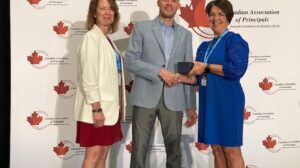In September, I attended the International Confederation of Principals Conference. I sat on a panel with five other very experienced school leaders from around the world. The topic was “What would you do differently?” An Irish administrator led off humorously that he should have considered engineering instead. I responded that I would have waited longer before entering administration. After nine years in a classroom, I became a VP. As I reflect on my 25 years in administration, I can say unequivocally that I should have spent more time in the classroom. I had not gotten teaching out of my system.
Almost every day as a teacher, I felt great about the way the lessons went and the engagement of the students. When I became a vice-principal, I missed the classroom for a long time. I still do, just not as often. The principal and vice-principal roles have changed so much in 25 years. The jobs have become more difficult and stressful, and less amenable to personal and family time. The demands and scrutiny on the people in the role have increased immensely under the guise of efficiency and accountability. I have often wondered how people who are entering administration in their late 20s or early 30s can possibly do this work for 20-plus years. Many set goals of becoming a superintendent or even director, but most are in it “for the long haul.”
Surviving while being effective in the role is an interesting dilemma. My work with the Toronto School Administrators’ Association (OPC Toronto local) supporting colleagues allowed me to make a few observations and recommendations. I believe that a consistent board policy
that regularly reassigns administrators to new school assignments is good for both school boards and individual administrators. A move every five to seven years – with the administrator’s consultation and support – is the best approach. It’s good to work in different schools and communities and for staff to be exposed to different leadership styles.
I have advised countless Members about various voluntary and statutory leaves (personal, maternity, parental, secondments and deferred salary). My advice for those who plan to be in the role for many years is to consider pursuing as many voluntary leaves as you can afford. When it comes to parental leaves, I have always tried to convince colleagues not to return before they need to. I learned myself the hard way that time taken away from family is time you never get back, and something for which you will have a hard time forgiving yourself.
Deferred salary programs are a great opportunity to self-fund an entire year off with pay, to do whatever you want. The traditional program has been the “four over five” (spreading out four years’ salary over five years, with the fifth year being a non-work year). Administrators who have taken advantage of deferred salary leaves, especially those who were able to time them to be at the same time as a partner’s similar leave, have raved about these leaves and the positive impact on their wellness.
Many administrators also have access in their Terms and Conditions (T&C) Agreement to secondment opportunities with other education sector organizations or personal leaves, during which they can pursue other work. This is a great opportunity to see how transferable their leadership experiences and skills in education are to other sectors, and to pursue career opportunities outside education after retirement.
When I started as an administrator, there was little discussion about workload and unreasonable demands for P/VPs, and no discussion about wellness. Today, school leaders as a group have never been younger and more overworked and stressed. I highly recommend that all P/VPs early in their careers give significant thought to including a “wellness plan” as part of their career path.
To those who are considering moving into administration, don’t feel pressured to enter too early. Do so when you are ready, and not when others think you are.
Ralph Nigro | president@principals.ca
Re-printed with permission of the Ontario Principals’ Council. First published in The Register, Winter 2024, Vol 26, No. 2.










